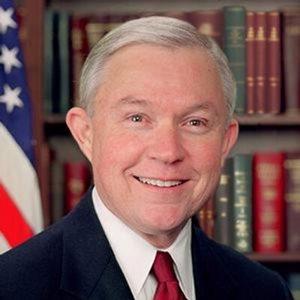This article was produced in collaboration with AlterNet and first appeared here.
Barrels of ink have been spilled over the prospect that the Trump administration could attempt to turn back the clock when it comes to legal marijuana, but for all the wailing and gnashing of teeth out there, marijuana industry insiders, advocates, and activists don't seem all that worried.

"Marijuana is one of the least of my concerns with the Trump administration," said Dale Gieringer, coauthor of the pioneering 1996 Prop 215 medical marijuana initiative and long-time head of California NORML. "That's the first time I've been able to say that, but I just don’t see where there's any percentage in them going after marijuana. The polls are on our side, and they can't enforce the law."
The industry, too, seems to think that there's not really that much to fear from the Trump administration.
"We are in a posture of cautious optimism," said Taylor West, communications director for the National Cannabis Industry Association (NCIA). "We're definitely not taking anything for granted -- it's quite clear that Sessions has really strong personal opposition to the industry -- but we are encouraged by the intense pushback, not just from the industry, but from elected officials, regulators, and lawmakers from both sides of the aisle. That is probably the most powerful signal to the Justice Department that dramatic changes to current policy would cause them a lot of problems."
West pointed to the strong reaction from state officials in marijuana-legal and medical marijuana states, as well as support from federal lawmakers and not just Democrats. She cited Nevada US Sen. Dean Heller as an example of a Republican lawmaker siding with the industry over the administration.
"They are speaking up because the industry and individual businesses and consumers have spoken up as their constituents and taught them about the industry and what we stand far and why we deserve respect from the federal government," she said.
And the marijuana money people appear largely unperturbed, too. In a report released Thursday, Arcview Market Research projected that the industry is going to continue to boom regardless of what happens in Washington, with revenues of nearly $7 billion this year and an astounding projected annual growth rate of 27% through 2021.
"While the uncertainty created by the mixed signals coming out of the administration may cause a temporary dip in some valuations of cannabis companies and some more risk-averse institutional investors and multinational companies may continue to stay on the sidelines, it won't impact the growth of the market much at all," said Troy Dayton, CEO of Arcview Market Research. "No matter what the administration does, states will continue to issue cannabis licenses to a long line of applicants and licensed cannabis outlets will continue to have long lines of consumers ready to purchase this product from regulated establishments."
Maintaining the Status Quo

Medical marijuana states at least are also protected by the Rohrabacher-Farr amendment, which bars the Justice Department from using federal funds to go after state-compliant medical marijuana operations. A similar measure, the McClintock-Hollis amendment, would have extended that same shield to the adult-legal states, but came up just short in the last Congress. Both amendments will be offered again this year.
"Jeff Sessions doesn't like marijuana -- that much is clear -- but that's not the question," MPP's Tvert argued. "The question is whether he believes limited federal resources should be used to interfere in state marijuana laws. As of right now, there's no reason to believe that's the case."
Tvert pointed to Sessions' seeming acceptance of the Cole memo, as well as a memo Sessions sent to federal prosecutors last month telling them to go after "the worst of the worst" and violent crime.
"State licensed and regulate marijuana businesses are by no means violent or the 'worst of the worst,'" Tvert noted. "They want to go after cartels and violent criminals and focus on serious crime, so why force marijuana back into the underground market?"
"President Trump said states should be able to determine own marijuana policies, and he also had strong support for legal access to medical marijuana, and we haven't heard anything new from him on it," said Tvert. "But again, it's not a question of the president's personal views, but of what the federal laws are and the realities of enforcement. Sessions has said on multiple occasions that the federal government cannot effectively enforce federal prohibition in states where it is legal."
The view was not quite as sanguine from Washington, DC, where national NORML has its offices.
"As far as the industry goes, even the threat of a crackdown by the Justice Department has a chilling effect," said Justin Strekal, NORML political director and lobbyist. "While medical marijuana is protected under Farr-Rohrabacher, the adult use economy has no such protections -- at least for now."
"The Cole memo is just a piece of paper," Strekal said, "and there is nothing stopping Sessions from just throwing it away, as the Heritage Foundation has called for him to do. But the Justice Department has no way to force states to recriminalize marijuana in decrim or legal states. The worst case would be that the adult use states are rolled back to a situation where there is no way to have a legal distribution system, but local law enforcement is not going to be enforcing federal marijuana prohibition."
Where apprehension about the direction of Trump administration pot policy is having a real impact right now is in causing politicians to think twice about legalization in states that are considering it, Strekal said.
"We're hearing feedback from legislators in Connecticut and Maryland saying that the attorney general's comments are acting as a road block, while in Georgia, we just saw a defelonization bill defeated. The mere presence of a Reefer Madness-era Jeff Sessions is frightening off potential supporters of ending prohibition."
Still, Bad Things Could Happen

"There could be some sort of federal action against some adult use facility or grower or cultivation company whose product is found to have gone across state lines in quantity, or something like that," CANORML's Gieringer offered. "Like if you have a situation where Nebraska complains, maybe that could stir up pressure in the Justice Department. But that's the most I expect. I could be wrong, though."
"Since Colorado started its licensing program, there's always been a fear that the Justice Department would just bring a lawsuit saying the state is participating in an ongoing conspiracy to distribute a Schedule I drug," Gieringer observed. "They had their chance and they didn't do it. If they tried it now, they will have taken away hundreds of millions of dollars from Colorado and potentially billions from other states and leave anarchy. They can't enforce the marijuana laws anyway; it's a drain on federal resources to even try."
"A federal injection is a potential threat, but it was a potential threat six months ago, too," said MPP's Tvert. "It's still a question of resources. If that were to happen, marijuana would continue to be legal, but the federal government would be preventing states from controlling its production and sale. That would be a real serious problem."
But Tvert warned that the heavy hand of the federal government could still reach out and slap someone down.
"Sean Spicer said they would have greater enforcement, and that could mean anything," he said. "They could be planning to more rigorously enforce the laws against people not in compliance with state laws, there could be more enforcement against illegal actors, they could push states to strengthen their regulations to prevent interstate trafficking. They perhaps could encourage states to increase funding to law enforcement to investigate illegal activity. There is plenty they could do without interfering with the legal market."
The Fightback Against Rollback Will Only Grow Stronger
The advent of a potential hostile Trump administration isn't changing the way NORML does business, Strekal said.
"We're continuing to do what we've always done and act as a grassroots consumer advocacy group," he explained. "We have 150 chapters and we're engaging as an advocacy group at every level of government from city councils to state legislatures to the federal government. At the federal level, we're very encouraged by the formation of the congressional cannabis caucus. We've been working with them to host a few events."
"This moment in time, where there is a lot of uncertainty at the federal level, is the kind of moment the NCIA was created for," said West. "We've been building relationships and allies in DC around industry issues, so when we need those allies, we have them."
Like MPP, the NCIA has a full-time staff lobbyist in Washington. It also works with another DC-based lobbying firm to work the Hill, and with legislators and elected officials.
"You've been able to see, through our work and the work of others, a very strong pushback from people who previously wouldn't have been in favor of the marijuana industry," West said. "The federal government can try to enforce marijuana prohibition in states where it is legal, but it doesn't really have the personnel to do that without the full cooperation of state and local law enforcement. If states are resisting that crackdown, which elected officials have said they would do, it becomes very difficult, if not impossible."
Legal marijuana is on guard, but it's not running away from a fight. The question for the Trump administration becomes whether this is a fight worth fighting.
This work by StoptheDrugWar.org is licensed under Creative Commons Attribution-ShareAlike 4.0 International
Comments
Trump supporters haven't been
Add new comment